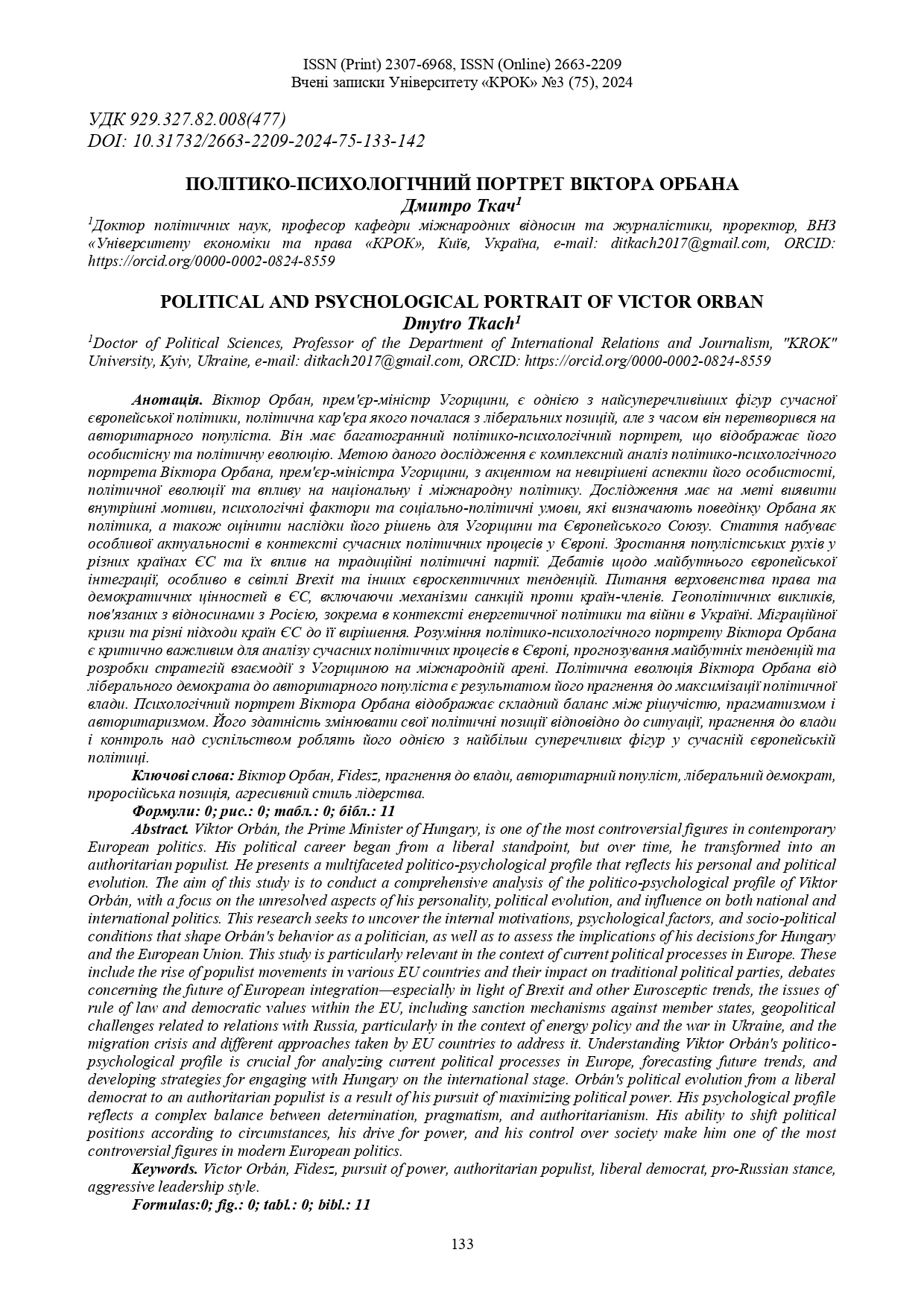POLITICAL AND PSYCHOLOGICAL PORTRAIT OF VICTOR ORBAN
DOI:
https://doi.org/10.31732/2663-2209-2024-75-133-142Keywords:
Victor Orbán, Fidesz, pursuit of power, authoritarian populist, liberal democrat, pro-Russian stance, aggressive leadership styleAbstract
Viktor Orbán, the Prime Minister of Hungary, is one of the most controversial figures in contemporary European politics. His political career began from a liberal standpoint, but over time, he transformed into an authoritarian populist. He presents a multifaceted politico-psychological profile that reflects his personal and political evolution. The aim of this study is to conduct a comprehensive analysis of the politico-psychological profile of Viktor Orbán, with a focus on the unresolved aspects of his personality, political evolution, and influence on both national and international politics. This research seeks to uncover the internal motivations, psychological factors, and socio-political conditions that shape Orbán's behavior as a politician, as well as to assess the implications of his decisions for Hungary and the European Union. This study is particularly relevant in the context of current political processes in Europe. These include the rise of populist movements in various EU countries and their impact on traditional political parties, debates concerning the future of European integration—especially in light of Brexit and other Eurosceptic trends, the issues of rule of law and democratic values within the EU, including sanction mechanisms against member states, geopolitical challenges related to relations with Russia, particularly in the context of energy policy and the war in Ukraine, and the migration crisis and different approaches taken by EU countries to address it. Understanding Viktor Orbán's politico-psychological profile is crucial for analyzing current political processes in Europe, forecasting future trends, and developing strategies for engaging with Hungary on the international stage. Orbán's political evolution from a liberal democrat to an authoritarian populist is a result of his pursuit of maximizing political power. His psychological profile reflects a complex balance between determination, pragmatism, and authoritarianism. His ability to shift political positions according to circumstances, his drive for power, and his control over society make him one of the most controversial figures in modern European politics.
Downloads
References
Семиженко, А. & Коберник, К. (2024). Колись Віктор Орбан був надією демократів. Тепер Угорщина — росія «на мінімалках», а її премʼєр — найкращий друг путіна в ЄС. URL: https://babel.ua/texts/103183-kolis-viktor-orban-buv-nadiyeyu-demokrativ-teper-ugorshchina-rosiya-na-minimalkah-a-jiji-prem-yer-naykrashchiy-drug-putina-v-yes-yak-tak-stalosya-rozpovidaye-ugorskiy-sociolog-i-politik-balint-madyar
Висоцька, Т. (2024). Хто такий Віктор Орбан – шанувальник Путіна, друг Трампа, опонент України. https://espreso.tv/article-khto-takiy-viktor-orban-shanuvalnik-putina-drug-trampa-nevtomniy-oponent-ukraini-politichniy-portret
Алексєєва, І. (2024). «Дискредитація та ревізія кордонів держав Європи»: політолог про таємні плани Орбана та кремля. URL: https://fakty.ua/440033-quot-diskreditaciya-i-reviziya-granic-gosudarstv-evropy-quot-politolog-o-tajnyh-planah-orbana-i-kremlya.
Aradi Hanga Zsófia & Andrea Horváth Kávai (2023). Transparency International: Hungary is the most corrupt country in the EU. URL: https://telex.hu/english/2023/01/31/transparency-international-hungary-is-the-most-corrupt-country-in-the-eu.
Тараненко, А. (2024). Від борця проти СРСР до ультраправого прибічника Путіна: все, що відомо про прем’єра Угорщини Віктора Орбана. URL: https://news.telegraf.com.ua/ukr/politika/2024-07-05/5861303-vid-bortsya-proti-srsr-do-ultrapravogo-pribichnika-putina-vse-shcho-vidomo-pro-premera-ugorshchini-viktora-orbana
Domján Anikó (2024). Politológus: Orbán Viktor egy nemzetközi sztár lett, akit mutogatnak. https://index.hu/belfold/2024/03/08/koztarsasagi-elnok-sulyok-tamas-novak-katalin-lakner-zoltan/
Klubrádió/L.Cs. (2021). Róna Péter: Orbán célja, hogy Magyarországot kidobják az EU-ból. URL: https://www.klubradio.hu/adasok/rona-peter-orban-celja-hogy-magyarorszagot-kidobjak-az-eu-bol-120606.
SZONDI LIPÓT KÁIN, A TÖRVÉNYSZEGŐ MÓZES, A TÖRVÉNYALKOTÓ. G O N D O L A T. BUDAPEST, 1987. URL: https://ru.scribd.com/doc/236637765/Szondi-Lipot-Kain-a-torvenyszeg%C5%91-Mozes-a-torvenyalkoto
Orbán Viktor beszéde 2022. március 15-én. URL: https://commons.wikimedia.org/wiki/File:Orb%C3%A1n_Viktor_besz%C3%A9de_2022._m%C3%A1rcius_15-%C3%A9n_(2).jpg
Lewin, K. (1951). Field theory in social science: selected theoretical papers (Edited by Dorwin Cartwright.). Harpers.
Leon Festinger. A Theory of Cognitive Dissonance. — Stanford University Press, 1962. — 291 p.

Downloads
Published
How to Cite
Issue
Section
License

This work is licensed under a Creative Commons Attribution-NonCommercial 4.0 International License.

